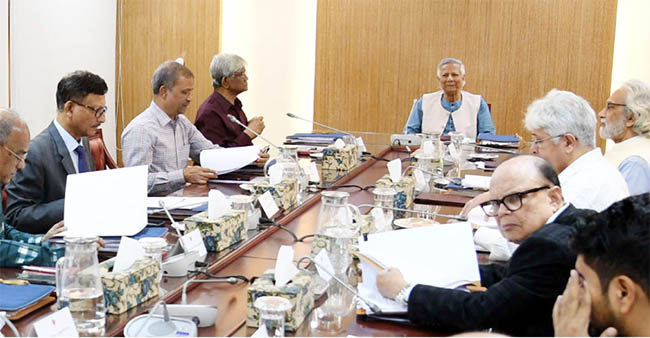The advisory committee has retracted its recommendation for punitive actions against political parties. In the draft of the International Crimes (Tribunals) Amendment Ordinance 2024, the advisory council of the interim government eliminated the clause that suggested punitive actions against political parties or organizations. The draft ordinance has been adopted by the council, albeit, with a few more changes.
The advisory committee has retracted… Under the direction of Chief Advisor Dr. Muhammad Yunus, the advisory council endorsed the document at a meeting today, Wednesday, at the Secretariat. Additionally, Dr. Muhammad Yunus was working from the Secretariat for the first time.
At a news conference held by the Chief Advisor’s news Wing in the evening at the Foreign Service Academy in the capital after the meeting, Professor Asif Nazrul, the interim government’s legal advisor, provided this information.
Advisor Asif Nazrul had previously discussed the draft of the International Crimes (Tribunals) Amendment Ordinance at the Secretariat on Tuesday. According to him, the court would have the power to suggest suitable punishment measures if accusations of crimes against humanity against any political party were proven true.
The court was not explicitly given these powers in the text. Rather, it stated that if the court deemed necessary punitive actions needed, it could suggest them to the appropriate authorities. The advisory committee has retracted.
The International Crimes (Tribunals) Amendment Ordinance 2024 draft was presented and approved at the advisory council meeting, according to the legal adviser at today’s press conference. But there was a significant issue discussed in the advisory council,” he said. The council believed that a clause for penalizing groups was included in the ordinance revision we had suggested. According to the proposed modification, the tribunal might suggest to the relevant authorities that an organization be punished if it was seen essential. The advisory committee has retracted.
“We don’t want to link this trial to any other issue,” was said at the advisory council meetings today. This law may unnecessarily raise questions if the issue of outlawing a political party or organization comes up. Such opportunities are not something we wish to permit. We want the trial to be conducted in full transparency. This clause has been eliminated as a result. The advisory committee has retracted.
According to Asif Nazrul, they have come to the realization that other rules are in existence in case a political party or organization needs to be banned for engaging in criminal activity, or if such a desire emerges in society. These laws, such as the Political Parties Ordinance of 1978, the Electoral Laws, and the Anti-Terrorism Act, have prohibitions that forbid groups. Consequently, the International Crimes (Tribunals) Amendment Ordinance’s lack of this clause does not preclude the possibility of responding to public demands or opinion in this way. Although it is not covered by the International Crimes (Tribunals) Law, it is possible to apply other laws that are now in effect in the nation. Such measures might be taken into consideration later if there is political agreement. The advisory committee has retracted.
The definition of international crimes, the determination of criminal liability, the recording and broadcasting of judicial proceedings through audio and video, provisions for foreign counsel, the accused’s rights during trial, interim appeals, provisions regarding the admissibility and relevance of testimony, the investigative officers’ search and seizure powers, provisions for observers, witness protection, and provisions for victim participation and protection are all updated in the draft amendment, according to a statement made earlier in the afternoon by the Cabinet Division.
In order to prosecute those suspected of crimes against humanity, war crimes, genocide, and other transgressions of international law, the International Crimes (Tribunals) Act was passed in 1973. This International Crimes Tribunal has already started the trial process for the murders that took place during the student-led rebellion.
The advisory committee has retracted


